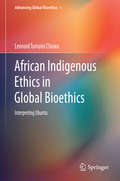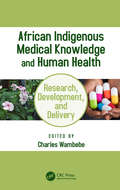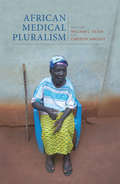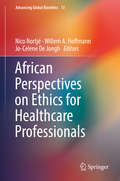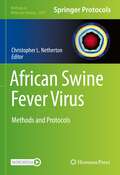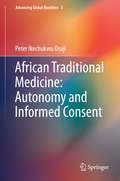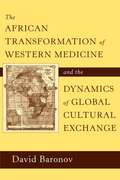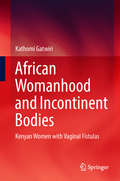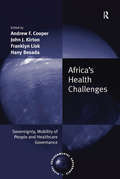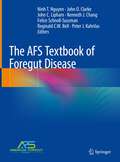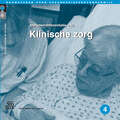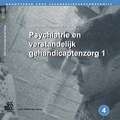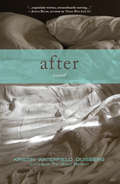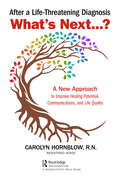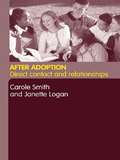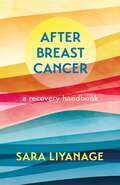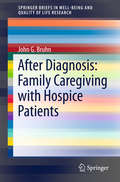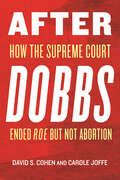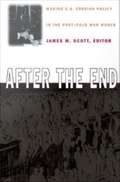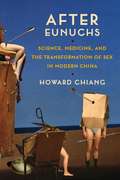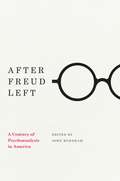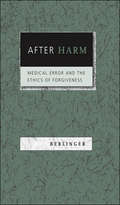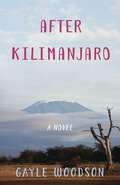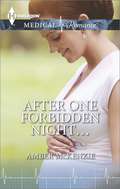- Table View
- List View
African Indigenous Ethics in Global Bioethics: Interpreting Ubuntu (Advancing Global Bioethics #1)
by Leonard Tumaini ChuwaThis book educates whilst also challenging the contemporary schools of thought within philosophical and religious ethics. In addition, it underlines the fact that the substance of ethics in general and bioethics/healthcare ethics specifically, is much more expansive and inclusive than is usually thought. Bioethics is a relatively new academic discipline. However, ethics has existed informally since before the time of Hippocrates. The indigenous culture of African peoples has an ethical worldview which predates the western discourse. This indigenous ethical worldview has been orally transmitted over centuries. The earliest known written African text containing some concepts and content of ethics is the "Declaration of Innocence" written in 1500 B. C. , found in an Egyptian text. Ubuntu is an example of African culture that presents an ethical worldview. This work interprets the culture of Ubuntu to explain the contribution of a representative indigenous African ethics to global bioethics. Many modern scholars have written about the meaning of Ubuntu for African societies over centuries. Some scholars have viewed Ubuntu as the greatest contribution of African cultures to other world cultures. None of the scholars, however has explored the culture of Ubuntu as providing a representative indigenous ethics that can contribute to global bioethics as discussed in this book.
African Indigenous Medical Knowledge and Human Health
by Charles WambebeDespite the relevance of and empirical evidence for African Traditional Medicine, based on African Indigenous Medical Knowledge (AIMK), research and development of new phytomedicines from this continent has been slow. African Indigenous Medical Knowledge and Human Health aims to provide a catalyst for health innovations based on the rich African biodiversity and AIMK. The book documents some of the success stories from the continent related to AIMK and serves as a one-step reference for all professionals interested in the research and development of medical interventions - including pharmacognosists, ethnobiologists, botanists, phytochemists, pharmacologists and medical scientists.
African Medical Pluralism
by William C. Olsen Carolyn SargentIn most places on the African continent, multiple health care options exist and patients draw on a therapeutic continuum that ranges from traditional medicine and religious healing to the latest in biomedical technology. The ethnographically based essays in this volume highlight African ways of perceiving sickness, making sense of and treating suffering, and thinking about health care to reveal the range and practice of everyday medicine in Africa through historical, political, and economic contexts.
African Perspectives on Ethics for Healthcare Professionals (Advancing Global Bioethics #13)
by Nico Nortjé Jo-Celene De Jongh Willem A. HoffmannThis book focuses on ethical issues faced by a variety of healthcare practitioners across the Anglophone African continent. This important resource contains in-depth discussions of the most salient current ethical issues by experts in various healthcare fields. Each profession is described from both an African and a South African perspective, and thus contributes to dialogue and critical thinking around African ethics and decision-making. In this way the book provides readers with an understanding of the ethical issues at hand in various professions, including the practical implications of the ethical issues and how to address those effectively. This is a beneficial resource for all those involved in the various healthcare professions addressed in this book, including undergraduate students, lecturers, researchers and practitioners across the continent. Simply put, with the dynamic changes and challenges in healthcare across the globe and in Africa, this is an indispensable resource for healthcare practitioners.
African Swine Fever Virus: Methods and Protocols (Methods in Molecular Biology #2503)
by Christopher L. NethertonThis volume provides a compilation of methods that will aid researchers studying virology, immunology, and vaccinology of this devastating disease of swine. Written in the format of the highly successful Methods in Molecular Biology series, each chapter includes an introduction to the topic, lists necessary materials and reagents, includes tips on troubleshooting and known pitfalls, and step-by-step, readily reproducible protocols. Authoritative and cutting-edge, African Swine Fever Virus: Methods and Protocols aims to be a foundation for future studies and to be a source of inspiration for new investigations in the field.
African Traditional Medicine: Autonomy And Informed Consent (Advancing Global Bioethics #3)
by Peter Ikechukwu OsujiThis book focuses on informed consent in African Traditional Medicine (ATM). ATM forms a large portion of the healthcare systems in Africa. WHO statistics show that as much as 80% of the population in Africa uses traditional medicine for primary health care. With such a large constituency, it follows that ATM and its practices should receive more attention in bioethics By comparing the ethics of care approach with the ATM approach to Relational Autonomy In Consent (RAIC), the authors argue that the ATM focus on consent based on consensus constitutes a legitimate informed consent. This book is distinctive insofar as it employs the ethics of care as a hermeneutic to interpret ATM. The analysis examines the ethics of care movement in Western bioethics to explore its relational approach to informed consent Additionally, this is the first known study that discusses healthcare ethics committees in ATM.
The African Transformation of Western Medicine and the Dynamics of Global Cultural Exchange
by David BaronovBeginning with the colonial era, Western biomedicine has radically transformed African medical beliefs and practices. Conversely, in using Western biomedicine, Africans have also transformed it. The African Transformation of Western Medicine and the Dynamics of Global Cultural Exchange contends that contemporary African medical systems—no less “biomedical” than Western medicine—in fact greatly enrich and expand the notion of biomedicine, reframing it as a global cultural form deployed across global networks of cultural exchange. The book analyzes biomedicine as a complex and dynamic sociocultural form, the conceptual premises of which make it necessarily subject to ongoing change and development as it travels the globe. David Baronov captures the complexities of this cultural exchange by using world-systems analysis in a way that places global cultural processes on equal footing with political and economic processes. In doing so, he both allows the story of Africa’s transformation of “Western” biomedicine to be told and offers new insights into the capitalist world system.
African Womanhood and Incontinent Bodies: Kenyan Women with Vaginal Fistulas
by Kathomi GatwiriThis book reveals the structures of poverty, power, patriarchy and imperialistic health policies that underpin what the World Health Organization calls the “hidden disease” of vaginal fistulas in Africa. By employing critical feminist and post-colonial perspectives, it shows how “leaking black female bodies” are constructed, ranked, stratified and marginalised in global maternal health care, and explains why women in Africa are at risk of developing vaginal fistulas and then having adequate treatment delayed or denied. Drawing on face-to-face, in-depth interviews with 30 Kenyan women, it paints a rare social portrait of the heartbreaking challenges for Kenyan women living with this most profound gender-related health issue – an experience of shame, taboo and abjection with severe implications for women’s wellbeing, health and sexuality. In absolutely groundbreaking depth, this book shows why research on vaginal fistulas must incorporate feminist understandings of bodily experience to inform future practices and knowledge.
Africa's Health Challenges: Sovereignty, Mobility of People and Healthcare Governance (Global Environmental Governance)
by Hany Besada Andrew F. Cooper John J. Kirton Franklyn LiskThis volume addresses the ideational and policy-oriented challenges of Africa’s health governance due to voluntary and involuntary cross-border migration of people and diseases in a growing 'mobile Africa'. The collected set of specialized contributions in this volume examines how national and regional policy innovation can address the competing conception of sovereignty in dealing with Africa’s emerging healthcare problems in a fast-paced, interconnect world.
The AFS Textbook of Foregut Disease
by Ninh T. Nguyen John O. Clarke John C. Lipham Kenneth J. Chang Felice Schnoll-Sussman Reginald C. W. Bell Peter J. KahrilasThe AFS Textbook of Foregut Disease serves as a comprehensive guide of information covering the fast-evolving field of foregut disease. This textbook is designed as a partnership between gastroenterologists & gastrointestinal surgeons with an understanding that an essential component of moving forward in this field is through collaboration. This AFS textbook has been developed by the American Foregut Society, a premier society for foregut disease and all chapters are written by experts in the field. Readership is intended for gastroenterologists, GI and thoracic surgeons, gastroenterology and general surgery residents and fellows, medical students, and integrated health members that manage foregut disease. All chapters follow an organized format that contains many graphs, tables, intraoperative photographs, and illustrations of techniques. This textbook provides the most up-to-date scientific information and will be the definitive resource to guide both the diagnosis and management of foregut disease for years to come.
Afstudeerdifferentiatie 412 Klinische zorg: Niveau 4
by Hanny Sluis Jan H.J. JongDit katern is geschreven voor BOL- en BBL-studenten die in de laatste fase zijn gekomen van de opleiding tot verpleegkundige. Het katern is een hulpmiddel bij het afstuderen en reikt verschillende mogelijkheden voor binnen en buitenschoolse verdieping aan. In het eerste hoofdstuk wordt de voorbereiding op de differentiatie belicht. In hoofdstuk 2 leert de student een eigen opfrisschema samen te stellen. Daarmee kan hij of zij de eerder eigen gemaakte leerstof die nodig is voor de differentiatie weer op een rijtje zetten en gebruiken als basis voor de verdieping. Tevens bevat dit hoofdstuk een uitgebreide lijst van informatiebronnen. In hoofdstuk 3 zijn casussen opgenomen die dienen als basis om te verdiepen en als leidraad voor het afstudeerproces en product.
Afstudeerdifferentiatie 414 Psychiatrie en verstandelijk gehandicaptenzorg 1
by Hanny Sluis Jan H.J. JongDifferentiatiekatern voor BOL- en BBL studenten die in de laatste fase zijn gekomen van de opleiding tot verpleegkundige niveau 4. Het katern is een hulpmiddel bij het afstuderen en reikt verschillende mogelijkheden voor binnen- en buitenschoolse verdieping aan. In de casuïstiek in dit katern komen de eindtermen van deelkwalificatie 414 meerdere malen op verschillende wijze aan bod. Gedurende de BPV toont de deelnemer dat hij/zij in staat is als verpleegkundige zorg te verlenen aan zorgvragers met een psychiatrische ziekte of verstandelijke handicap (414.03). Het kunnen toepassen van GVO (414.04) wordt eveneens in de BPV getoond. Ook het kunnen coördineren van zorg (414.05) wordt in de BPV getoond. De subeindtermen zijn vertaald in taken bij de casussen. Het bevorderen van kwaliteitszorg en deskundigheidsbevordering ten aanzien van psychiatrie en verstandelijk gehandicaptenzorg (413.06) wordt geleerd met behulp van projecttaken.
After
by Kristin Waterfield DuisbergNina Baldwin's perfect life unravels after she is diagnosed with breast cancer. As she struggles to remain a good wife and mother, her husband retreats into harrowing memories of his childhood in a family of Nazi sympathizers, and her awkward, extraordinary daughter sinks further into pre-teen misery. Isolated and afraid, Nina seeks escape in places she never imagined she would.
After a Life-Threatening Diagnosis...What's Next?: A New Approach to Improve Healing Potential, Communications, and Life Quality
by Carolyn HornblowThis book should prove valuable in relieving stress and anxiety, especially important nowadays as the journey from diagnosis to cure or death is longer due to improvements in medical treatments. Healthcare workers and the general public worldwide would benefit as death is universal. The writing style is engaging and easy to read, yet highly informative. I would recommend this book to my patients and their families and friends. Dr. Suzanne Ward BMED FRAGP General Medical Practitioner Canberra, Australia This easy to read manual is invaluable reading following a life-threatening medical diagnosis. It is a comprehensive, clear and concise guide which can help reduce stress and improve healing potential. Written by a Registered Nurse (ret) who worked in the USA, UK, and Australia, she discusses why expressing fears soon after diagnosis can be beneficial for healing. Whatever the diagnosis, Cancer, Heart Attack, Stroke, Parkinson’s Disease, etc., you, your family, friends and colleagues will have worries and fears about your future. Reducing fears and stress early on gives more positive room for healing. This manual is indispensable for Doctors and Nurses, encouraging them to learn why and how discussing fears early on is a positive healing opportunity rather than being negative. Various complementary therapies are discussed to use in combination with traditional medicine, maximizing healing opportunities. While we plan for births and marriages, we find it difficult to talk and plan for our deaths, even though none of us escapes it! This book provides tools and suggestions for preparing Wills, Advanced Directives, and listing assets and wishes at whatever age, the sooner the better. Being prepared makes life so much easier for all. Learn how to live a more content, peaceful life alongside your family, friends, neighbors and globally. Life is not a dress rehearsal. Learn how to live fully NOW.
After Adoption: Direct Contact and Relationships
by Carole Smith Janette LoganFew children nowadays are placed for adoption with no form of contact planned with birth relatives and it has become common professional practice to advocate direct rather than indirect contact. Practice has outstripped evidence in this respect and not enough is known about how contact arrangements actually work out, particularly for older children adopted from state care. Such children have often experienced neglect, and sometimes abuse, and have frequently been adopted without parental agreement. Based on research with a large number of adoptive parents, children and birth relatives, After Adoption considers the impact of direct post-adoption contact on all concerned in such cases. It also:· discusses the development of adoption policy and law, particularly with regard to the legal and social consequences · reviews the research evidence on adopted children's contact with their birth families· explores through interviews: participants' feelings about adoption and direct contact; their relationships with each other; what hinders and what helps.After Adoption challenges readers to re-think the relationship between adoption and the possibility of direct post-adoption contact and at the same time provides a comprehensive understanding of adoption issues. It is a timely and valuable addition to the literature on adoption, making a substantial contribution to policy and practice.
After Breast Cancer: A Recovery Handbook
by Sara Liyanage'Once treatment stops, and people leave strictly managed clinical environments, survivors feel as though they had "fallen off a cliff edge"... feeling isolated and abandoned at a time when support is needed the most'. - Mental Health Foundation From the final infusion to the five-year check, After Breast Cancer gives a step-by-step support package to coping post-treatment. It follows on from Sara Liyanage's successful coverage of diagnosis and treatment in Ticking Off Breast Cancer, and is driven not only by her experience of illness, but underpinned by contributions from leading oncologists, heads of cancer services, and clinical consultant psychologists. With a readable blend of informality and medically endorsed insight, After Breast Cancer has an optimistic outlook and a reassuring tone, but doesn't flinch from discussing the possibility of secondary cancer, or the full impact of treatment and surgery on you or your loved one. It features a huge amount of practical information, including a full toolkit for navigating the days post-treatment - including breathing exercises, mindfulness meditation, journaling, affirmations and a healthy bedtime routine. Designed for women of all backgrounds, whatever the nature of their diagnosis, this blend of approachability, lived experience and medical insight puts the power firmly back in your hands, as a breast cancer survivor.
After Breast Cancer: A Recovery Handbook
by Sara Liyanage'Once treatment stops, and people leave strictly managed clinical environments, survivors feel as though they had "fallen off a cliff edge"... feeling isolated and abandoned at a time when support is needed the most'. - Mental Health Foundation From the final infusion to the five-year check, After Breast Cancer gives a step-by-step support package to coping post-treatment. It follows on from Sara Liyanage's successful coverage of diagnosis and treatment in Ticking Off Breast Cancer, and is driven not only by her experience of illness, but underpinned by contributions from leading oncologists, heads of cancer services, and clinical consultant psychologists. With a readable blend of informality and medically endorsed insight, After Breast Cancer has an optimistic outlook and a reassuring tone, but doesn't flinch from discussing the possibility of secondary cancer, or the full impact of treatment and surgery on you or your loved one. It features a huge amount of practical information, including a full toolkit for navigating the days post-treatment - including breathing exercises, mindfulness meditation, journaling, affirmations and a healthy bedtime routine. Designed for women of all backgrounds, whatever the nature of their diagnosis, this blend of approachability, lived experience and medical insight puts the power firmly back in your hands, as a breast cancer survivor.
After Diagnosis: Family Caregiving with Hospice Patients (SpringerBriefs in Well-Being and Quality of Life Research)
by John G. BruhnThis brief provides approaches to help family caregivers understand the role of caregiving, its challenges and consequences. Using real life case examples, it illustrates the essentials of family caregiving. The caregiving role can be a source of caregiver stress and can become increasingly burdensome. People are now living longer and acquiring chronic diseases, which makes it necessary to involve caregivers to assist in disability care for longer periods of time, and live out their end-time at home, which means caregivers are more and more needed, especially at the end-of-life. This brief illustrates the role and scope of caregiving and its future growth. It is useful to physicians, social workers, sociologists, psychologists, nurses, public health, public policy and families and has a broad appeal for use in courses on Death and Dying.
After Dobbs: How the Supreme Court Ended Roe but Not Abortion
by David S. Cohen Carole JoffeHow hard-working individuals have kept abortion afloat in the wake of Roe v. Wade&’s destruction, and the continued help needed if we want to sustain itWhen the Supreme Court overturned Roe v. Wade in June 2022, many feared it meant the end of abortion access in the United States. Yet the courageous work of people on the ground has allowed abortion to survive post-Dobbs in ways that no one predicted.In After Dobbs, law professor David S. Cohen and sociologist Carole Joffe interview 24 people across all different fields in abortion and in different state political environments to uncover how the abortion providing community and its allies prepared for, and then responded to this momentous event. Taking place across three intervals throughout 2022—pre-Dobbs in early 2022, right after Dobbs, and then six months later—these interviews showcase how nimble thinking on the part of providers, growth and new delivery models of abortion pills, and the never-ending work of those who help with abortion travel and funding have ensured most people who want them are still getting abortions, even without Roe.But, as much as this is cause for celebration, the work required to make abortion possible is difficult and costly—in time, money, and emotion. There may soon come a time when the overturning of Roe means a much more severe decline in the number of people able to obtain the abortions they seek. But because of the work of the people in this book and those like them, even though Roe is dead, abortion is not . . . yet.
After The End: Making U.S. Foreign Policy in the Post-Cold War World
by James M. ScottIn the political landscape emerging from the end of the Cold War, making U. S. foreign policy has become more difficult, due in part to less clarity and consensus about threats and interests. In After the End James M. Scott brings together a group of scholars to explore the changing international situation since 1991 and to examine the characteristics and patterns of policy making that are emerging in response to a post-Cold War world. These essays examine the recent efforts of U. S. policymakers to recast the roles, interests, and purposes of the United States both at home and abroad in a political environment where policy making has become increasingly decentralized and democratized. The contributors suggest that foreign policy leadership has shifted from White House and executive branch dominance to an expanded group of actors that includes the president, Congress, the foreign policy bureaucracy, interest groups, the media, and the public. The volume includes case studies that focus on China, Russia, Bosnia, Somalia, democracy promotion, foreign aid, and NAFTA. Together, these chapters describe how policy making after 1991 compares to that of other periods and suggest how foreign policy will develop in the future. This collection provides a broad, balanced evaluation of U. S. foreign policy making in the post-Cold War setting for scholars, teachers, and students of U. S. foreign policy, political science, history, and international studies. Contributors. Ralph G. Carter, Richard Clark, A. Lane Crothers, I. M. Destler, Ole R. Holsti, Steven W. Hook, Christopher M. Jones, James M. McCormick, Jerel Rosati, Jeremy Rosner, John T. Rourke, Renee G. Scherlen, Peter J. Schraeder, James M. Scott, Jennifer Sterling-Folker, Rick Travis, Stephen Twing
After Eunuchs: Science, Medicine, and the Transformation of Sex in Modern China
by Howard ChiangFor much of Chinese history, the eunuch stood out as an exceptional figure at the margins of gender categories. Amid the disintegration of the Qing Empire, men and women in China began to understand their differences in the language of modern science. In After Eunuchs, Howard Chiang traces the genealogy of sexual knowledge from the demise of eunuchism to the emergence of transsexuality, showing the centrality of new epistemic structures to the formation of Chinese modernity.From anticastration discourses in the late Qing era to sex-reassignment surgeries in Taiwan in the 1950s and queer movements in the 1980s and 1990s, After Eunuchs explores the ways the introduction of Western biomedical sciences transformed normative meanings of gender, sexuality, and the body in China. Chiang investigates how competing definitions of sex circulated in science, medicine, vernacular culture, and the periodical press, bringing to light a rich and vibrant discourse of sex change in the first half of the twentieth century. He focuses on the stories of gender and sexual minorities as well as a large supporting cast of doctors, scientists, philosophers, educators, reformers, journalists, and tabloid writers, as they debated the questions of political sovereignty, national belonging, cultural authenticity, scientific modernity, human difference, and the power and authority of truths about sex. Theoretically sophisticated and far-reaching, After Eunuchs is an innovative contribution to the history and philosophy of science and queer and Sinophone studies.
After Freud Left: A Century of Psychoanalysis in America
by John BurnhamFrom August 29 to September 21, 1909, Sigmund Freud visited the United States, where he gave five lectures at Clark University in Worcester, Massachusetts. This volume brings together a stunning gallery of leading historians of psychoanalysis and of American culture to consider the broad history of psychoanalysis in America and to reflect on what has happened to Freud’s legacy in the United States in the century since his visit There has been a flood of recent scholarship on Freud’s life and on the European and world history of psychoanalysis, but historians have produced relatively little on the proliferation of psychoanalytic thinking in the United States, where Freud’s work had monumental intellectual and social impact. The essays in After Freud Left provide readers with insights and perspectives to help them understand the uniqueness of Americans’ psychoanalytic thinking, as well as the forms in which the legacy of Freud remains active in the United States in the twenty-first century. After Freud Left will be essential reading for anyone interested in twentieth-century American history, general intellectual and cultural history, and psychology and psychiatry.
After Harm: Medical Error and the Ethics of Forgiveness
by Nancy BerlingerMedical error is a leading problem of health care in the United States. Each year, more patients die as a result of medical mistakes than are killed by motor vehicle accidents, breast cancer, or AIDS. While most government and regulatory efforts are directed toward reducing and preventing errors, the actions that should follow the injury or death of a patient are still hotly debated. According to Nancy Berlinger, conversations on patient safety are missing several important components: religious voices, traditions, and models. In After Harm, Berlinger draws on sources in theology, ethics, religion, and culture to create a practical and comprehensive approach to addressing the needs of patients, families, and clinicians affected by medical error. She emphasizes the importance of acknowledging fallibility, telling the truth, confronting feelings of guilt and shame, and providing just compensation. After Harm adds important human dimensions to an issue that has profound consequences for patients and health care providers.
After Kilimanjaro: A Novel
by Gayle WoodsonDr. Sarah Whitaker has always been an obedient overachiever, but she is burned out. Training to be a surgeon is stressful. So when her fiancé, David, offers a solution—take a break year at a hospital in Africa and climb Mount Kilimanjaro together—she jumps on board. When he backs out, she embarks on the adventure alone. Sarah quickly falls in love with Tanzania, a land of gentle people, exotic wildlife, and stunning natural beauty, from the sands of Zanzibar to the peaks of Kilimanjaro. She also develops great respect for new Tanzanian friends: strong African women who strive to serve an overwhelming need for health care. Shocked by the high rate of maternal mortality and the scourge of female genital mutilation in the country, Sarah begins to speak out against FGM and develops an experimental program to train tribal birth attendants in a remote mountain village. Conditions are primitive there, and life is fragile. The separation takes its toll on her relationship with David, and she fights against feelings for another man. As the months pass, one thing becomes clear: if Sarah survives this year, her life will never be the same again.
After One Forbidden Night...
by Amber MckenzieThe cost of the forbidden...Successful E.R. physician Dr. Chloe Darcy has her professional life all sewn up. Her love life is another matter! Being secretly in love with powerful, charismatic vascular surgeon Tate Reed is torture.... As her best friend's ex, he's strictly off-limits!Yet when their sizzling attraction becomes too hard to resist, giving in to their desire seems inevitable. And if this is all they can ever have then Chloe is determined to savor every moment. Until she learns of the consequences of their one forbidden night...
